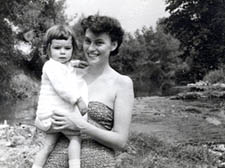|
|
 |
| |

Elisabet Charlotte Horstmeyer, known as Lottchen, with daughter Nicky |
The asylum-seeker’s child
London’s deputy mayor Nicky Gavron tells Dan Carrier how her mother being banned from the opening ceremony of the1936 Berlin Olympics led to a drastic new twist in her family history
IT was a great honour to be chosen to dance at the opening ceremony of the 1936 Berlin Olympics. The Nazi government was using the games as a showpiece to tell the world the wonders of Nazism.
And so for Elisabet Charlotte Horstmeyer, aged 16, the fact she had been asked to perform when the world’s eyes would be on the Olympiastadion in Berlin was no small matter.
However, Lottchen, as she was known, was classed as a Jew. Her mother, Felicia Wongrowitz was Jewish, although her father was not. When the authorities discovered this, she was banned from taking part. This was the final straw for her parents: it underlined the dangers of living in Germany. They took the hard decision to send their teenage daughter abroad, on her own. It was a decision that saved her life.
Lottchen, as she was known, was the mother of London’s deputy mayor Nicky Gavron, and Nicky, who this week is marking the Holocaust Memorial Day on Sunday, has only recently discovered the stories of her family’s fates.
“From that moment on, my mother’s life changed dramatically,” says Nicky. “She was dropped from the dance troupe and made to wear the Yellow Star.”
It led her to being persecuted at her school and her parents were advised by non-Jewish friends and neighbours that now was the time to act.
“They were told by fellow teachers that it was time to get Lottchen away from such a poisonous atmosphere,” said Nicky.
But poor Lottchen was never to see her mother again, because although her mother survived the war with the help of sympathetic Germans, she fell ill with cancer and died before they could be reunited. One of the few items that remain of her grandmother are two letters which arrived in 1940 via the Red Cross. The Germanic, careful script is a poignant link to the past.
Luckily her grandparents were to survive. They were hidden by brave Germans who ran enormous risks to save their lives. “They were tipped off when there were due to be round-ups,” says Nicky.
“They carried a small suitcase with them and cyanide pills. They were prepared for the worst.”
By now their daughter was settling into a new life but having to live with the daily terror of not knowing how her parents were faring.
“Because she was a refugee, she was told she could only do two things: be a maid or a nurse. She opted for nursing and went to train at an orthopaedic hospital in Oswestry,” recalls Nicky.
But even in the relative safety of Shropshire the war would affect her. “Just before she qualified, the hospital was taken over by the military and being German she was told to leave,” says Nicky.
“Her radio and camera was taken from her and she was given £1 and told to get out.”
She eventually found work as an nursing auxiliary and settled in Worcester, where Nicky grew up.
Lottchen’s wartime experiences, her grief compounded by the father who arrived in England a broken man, were rarely spoken about. “My mother did not want to bring it up,” says Nicky. “Her grief for her friends and relatives who had perished in unmarked graves in the east was powerful, a haunting memory, and my grandfather was a shadow of his former self.”
However, before her mother died, she asked Nicky to find one of her cousins she knew had survived.
“She told me there was a relative of hers she had always wanted to find,” recalls Nicky.
His name is Henry Friedlander and, after her mother’s death, Nicky tracked him down to Washington in the US.
He had been in Auschwitz and other death camps but managed by a dose of good fortune to avoid the gas chambers. After the war, he made his way to America where he became an academic, studying the Holocaust.
Professor Freidlander has written on how the Nazi’s tested their industrialised system of murder by killing off people with disabilities before turning their attention to Jews and Romanies.
He visited Nicky in December and revealed the fate of many of Nicky’s relatives.
Professor Friedlander brought pictures and letters with him – “an emotional experience, seeing photographs of the uncles and aunts we had lost,” says Nicky. “I had heard a little about it from my mother. She had spoken about her relatives with great sadness, but there was much she did not speak of.”
Professor Friedlander filled in some of the gaps.
“He was taken to the Lodz ghetto in Poland in 1941 and stayed there until it was liquidated in 1944. He was then sent on to Auschwitz, were he was about to be killed. He was in a block with other teenagers and they were about to be murdered when the supervisor – a camp inmate arrested for being a Communist and given the unenviable task of corralling his fellow prisoners into lines to be taken away – had come from the Wedding district in Berlin where Henry lived. He had helped Henry by finding him extra food and as the queues were being formed, he pushed him out of line and said he was in the wrong block – a move that saved his life.
And discovering her family’s experiences have cemented Nicky’s political principles. The deputy mayor believes the crucial lessons the Holocaust Memorial Day underlines form the moral imperative of fighting any form of bigotry.
“It was such a terrible evil, and shows why London, a traditional haven for the dispossessed, for those seeking asylum from oppression, must never forget,” said Nicky. |

|
 |
|
 |
|

